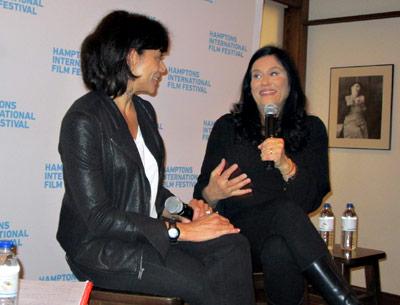From Harlan County To the Hemingways

The Hamptons International Film Festival’s Rowdy Talks series kicked off Friday morning at Rowdy Hall in East Hampton with a conversation between Barbara Kopple, a two-time Academy Award-winning filmmaker, and Julie Anderson, executive producer of documentaries and development for WNET/Thirteen. Perhaps best known for “Harlan County USA” and “American Dream,” which earned Oscars for best documentary feature in 1977 and 1991, Ms. Kopple was in East Hampton for festival screenings of “Running From Crazy,” her new documentary about Mariel Hemingway and the Hemingway family’s history of mental illness and suicide.
Both Ms. Kopple and Ms. Anderson grew up in Scarsdale, and both laughed at the fact it was once a source of shame for them. Ms. Kopple said that when she was making “Harlan County USA,” about a coal miners’ strike in southeastern Kentucky, “I could see the headline: Scarsdale girl goes to the coal fields. I couldn’t think of anything worse. So instead I told people I was from Shrub Oak, N.Y., where my grandparents had a place.”
Recalling the experience of “Harlan County,” Ms. Kopple said it was the most difficult film of her career, because it was her first, and because nobody believed in her. It was difficult to get funding, and her friends were skeptical about the project. Once in Kentucky, “Life in the coal fields wasn’t that great to begin with.” Soon after her arrival, one of the union organizers opened a suitcase and asked her which gun she would like. When she demurred, he insisted. “So I just took the smallest one I could find,” she said. In addition, the local women didn’t trust her and her crew at first, thinking they were perhaps working for the coal company.
One morning the crew was supposed to be at the picket line at 5 a.m. Driving down a mountain in the rain, their car flipped over. “We had promised to be there,” recalled Ms. Kopple. “So we got our gear out and left the car and walked all the way to the picket site.” After that, they were accepted. “News travels fast in the coal fields,” she explained. During the shoot, a company foreman killed a miner, and semi-automatic carbines were fired at the filmmakers and miners. “It was challenging, but when you’re in your early 20s you think you’re going to live forever.”
Ms. Anderson asked the director about making a film not of her own conception. “I love it,” Ms. Kopple said. “Because it’s often something I never would have thought of.” One example was “Fallen Champ: The Untold Story of Mike Tyson,” which she produced and directed for NBC.
“The heavy thing in that film for me,” the filmmaker said, “was finding Desiree Washington, whom Mike Tyson had been convicted of raping. She had hidden herself, so I hired a private detective to find her, and he did. But instead of bothering her, I decided to interview her father, who told me everything I needed to know, without my having to intrude on Desiree. There’s got to be a lot of trust, and a lot of responsibility, when you’re dealing with people’s lives.”
Two years after completing the film, she found herself staying in a hotel on the same floor as Mr. Tyson. When they ran into each other she was anticipating a less than enthusiastic reaction, but he took the filmmaker in his arms, swung her around, and said, “I loved it! Can I get some copies?”
“Wild Man Blues,” a documentary feature on Woody Allen’s New Orleans Jazz Band’s successful tour of France, Spain, Italy, and England, was another interesting project. “All my feminist friends said do not do this film. But I said, ‘Are you crazy? Of course I’m going to do this film!’ I went to talk to Woody and his sister, Letty. I said I was going to get everything, and that Woody would have to let me into his world. He said, ‘No problem.’ And he was true to his word.” One of her favorite experiences during the film was going with Mr. Allen and his sister to meet their parents. “What I learned was, even if you’re Woody Allen, when you go home, you’re only 12 years old.”
“Running From Crazy” came about when a friend of Mariel Hemingway’s who works for Oprah Winfrey asked Ms. Kopple if she would consider making a film about Ms. Hemingway and the Hemingway family. At first, when the idea was proposed to Ms. Hemingway, she reportedly opposed it because she felt her extended family was “too nuts.” She agreed to meet with the filmmaker, however, and they felt so comfortable with each other that the project proceeded. “Mariel set no parameters,” according to Ms. Kopple. The most unexpected event was the discovery of 43 hours of never-before-seen footage of Ms. Hemingway’s sister Margaux, a model and actress who committed suicide at the age of 43. It was found at Minnesota’s WPA Film Library, a leading source of stock footage. “I was ecstatic beyond belief. Margaux was larger than life; the camera loved her.”
The film combines extended footage of Margaux Hemingway, old family movies and photographs of their father and mother and their grandfather Ernest Hemingway, extended and intimate conversations with Mariel Hemingway, and documentary footage, to create a nuanced portrait of a complex, troubled family, and the daughter and grandchildren who have weathered the familial storms.
Ms. Kopple has two films in the works. One is about The Nation magazine on the occasion of its 150th anniversary. The other — talk about high contrast — is a portrait of the soul-singer Sharon Jones and her band the Dap-Kings. Ms. Jones was diagnosed with Stage 1 bile duct cancer in June. “She’s a beautiful spirit,” Ms. Kopple said of the singer, “and I’m very happy to be working with her. It’s not a film about cancer. It’s a film, I hope, about a comeback.”
